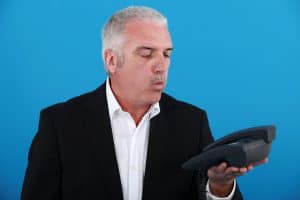
You had what you thought – or hopefully felt – was a good interview, at least to move into next stages. But it’s been more than a week and you’ve heard nada.
Don’t jump to conclusions.
First, don’t panic or assume the worst. The employer may still be interviewing other candidates, and you may still be a contender. A few weeks may seem like forever to you, but it isn’t an unusual time-frame for an organization to take when filling an essential position.
However, if you were told that you would hear from the company within a week and at least two weeks have passed, it’s absolutely appropriate for you to make a follow-up phone call. You should be prepared mentally to hear bad news, as well as good. Try to speak directly with the person who interviewed you, and make a conscious effort to be friendly, professional and brief. Reintroduce yourself, remind the person when you interviewed, and ask, very simply, whether the organization has made a hiring decision yet. If your best option is to talk to the person’s assistant or to voice mail, leave the same message.
Be straight. Don’t talk about the wonderful offer you’ve just received from the company’s top competitor. Don’t talk about the tension you’re feeling. And make it very transparent that all you’re looking for is an answer to whether the position has been filled; and whether you’re still a candidate – period.
[bctt tweet=”Always look forward – and keep your head up and be future-focused.” username=”hireimaging”]
If, on the other hand, something has happened in the interlude that would support your case as a candidate – you’ve just completed training or been credentialed in a particular skill, received an honor or award, and so on – it can’t hurt to reference it. And don’t forget that it never hurts to keep saying, “I’m really interested in this job and know I could do it well.”
Learn from the experience.
If you don’t end up with an offer – or even make it to the next steps, the interview process can still be beneficial – as long as you’re willing to objectively evaluate how you did, and are willing to learn from your mistakes. Here are some questions that you can ask yourself after the interview.
- Did I physically look my best?
- Did I prepare as well as I could have, learning as much as I could about the company, the position, and anything else relating to the job?
- Did I take care of things ahead of time, so that I arrived at the interviewer’s office in plenty of time (and not too early), in a calm state of mind?
- Did I handle myself with composure and confidence when I first entered the office?
- Did I practice appropriate business etiquette from the time I walked until I left?
- When I was given the chance, did I present a synopsis of myself in a focused, succinct way?
- Was I an engaged, focused listener throughout the interview?
- Was I able to answer questions in a relaxed, confident manner?
- Did I show enthusiasm and interest in the job?
- Did I tie my skills and success stories to the needs of the job?
- Did I handle distractions or interruptions without any concern?
- Did I close the interview on a self-assured, optimistic tone?
Honestly assess your answer to these questions. Be objective, but don’t be too hard on yourself either. And instead of dwelling on the things you did “wrong,” think about what you can do the next time to avoid the same mistakes. Always look forward – and keep your head up and be future-focused. There’s always the next time to put into practice what you’ve learned along the way!
What do you think?

